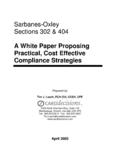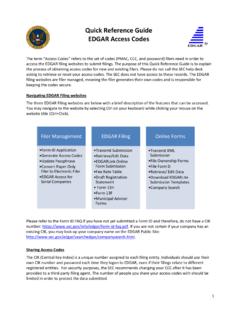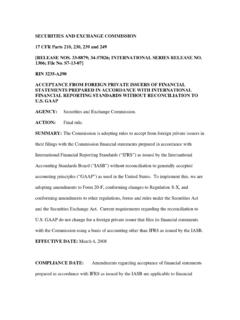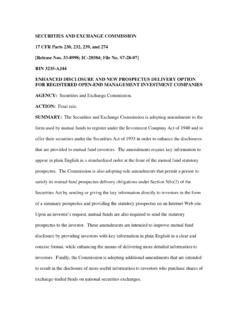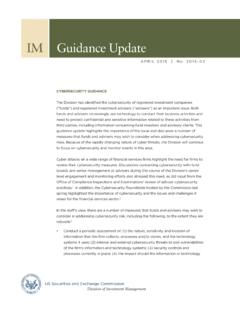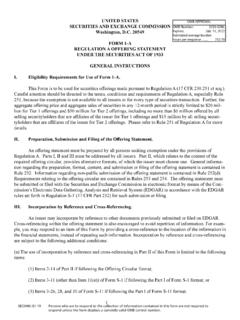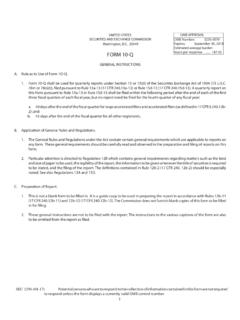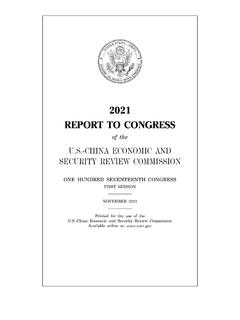Transcription of SECURITIES AND EXCHANGE COMMISSION 17 CFR PARTS …
1 SECURITIES AND EXCHANGE COMMISSION 17 CFR PARTS 211, 231 and 241 [Release Nos. 33-9106; 34-61469; FR-82] COMMISSION Guidance Regarding Disclosure Related to Climate Change AGENCY: SECURITIES and EXCHANGE COMMISSION . ACTION: Interpretation. SUMMARY: The SECURITIES and EXCHANGE COMMISSION ( SEC or COMMISSION ) is publishing this interpretive release to provide guidance to public companies regarding the COMMISSION s existing disclosure requirements as they apply to climate change matters. EFFECTIVE DATE: February 8, 2010. FOR FURTHER INFORMATION CONTACT: Questions about specific filings should be directed to staff members responsible for reviewing the documents the registrant files with the COMMISSION . For general questions about this release, contact James R.
2 Budge at (202) 551-3115 or Michael E. McTiernan, Office of Chief Counsel at (202) 551-3500, in the Division of Corporation Finance, SECURITIES and EXCHANGE COMMISSION , 100 F Street, NE, Washington, DC 20549. SUPPLEMENTARY INFORMATION: I. Background and purpose of interpretive guidance A. Introduction Climate change has become a topic of intense public discussion in recent years. Scientists, government leaders , legislators, regulators, businesses, including insurance companies, investors, analysts and the public at large have expressed heightened interest in climate change. International accords, federal regulations, and state and local laws and regulations in the address concerns about the effects of greenhouse gas emissions on our environment,1 and international efforts to address the concerns on a global basis The Environmental Protection Agency is taking action to address climate change concerns,3 and Congress is considering climate change Some business leaders are increasingly recognizing the current and potential effects on their companies performance and operations, both positive and negative.
3 That are associated with climate change and with efforts to reduce greenhouse gas Many companies are providing information to their peers and to the public about their carbon footprints and their efforts to reduce 1 For a listing of state and local government laws and regulations in this field, see Two significant international accords related to this topic are the Kyoto Protocol, which was adopted in Kyoto, Japan, on December 11, 1997 and became effective on February 16, 2005, and the European Union Emissions Trading System (EU ETS), which was launched as an international cap and trade system of allowances for emitting carbon dioxide and other greenhouse gases, built on the mechanisms set up under the Kyoto Protocol. See and for a more detailed discussion of the Kyoto Protocol and EU ETS, respectively.
4 2 For example, in December 2009, Copenhagen, Denmark hosted the United Nations Climate Change Conference. 3 See , Current and Near-Term Greenhouse Gas Reduction Initiatives, available at , for a discussion of EPA initiatives as well as other federal initiatives. 4 See , American Clean Energy and Security Act of 2009, , 111th Cong., 1st Sess. (2009), passed by the House of Representatives on June 26, 2009, and Clean Energy Jobs and American Power Act of 2009, S. 1733, 111th Cong., 1st Session (2009), introduced in the Senate September 30, 2009. 5 See Appendix F to the Petition for Interpretive Guidance on Climate Risk Disclosure submitted September 18, 2007, File No. 4-547, for a sampling of comments by business leaders relating to climate change regulation and disclosure, available at 6 Companies are assessing and reporting on their greenhouse gas emissions and other climate change related matters using standards and guidelines promulgated by organizations with specific expertise in the field.
5 Three such organizations are the Climate Registry, the Carbon Disclosure Project and the Global reporting Initiative. We discuss this in more detail below. 2 This release outlines our views with respect to our existing disclosure requirements as they apply to climate change matters. This guidance is intended to assist companies in satisfying their disclosure obligations under the federal SECURITIES laws and regulations. B. Background 1. Recent regulatory, legislative and other developments In the last several years, a number of state and local governments have enacted legislation and regulations that result in greater regulation of greenhouse gas Climate change related legislation is currently pending in Congress.
6 The House of Representatives has approved one version of a bill,8 and a similar bill was introduced in the Senate in the fall of This legislation, if enacted, would limit and reduce greenhouse gas emissions through a cap and trade system of allowances and credits, among other provisions. The Environmental Protection Agency has been taking steps to regulate greenhouse gas emissions. On January 1, 2010, the EPA began, for the first time, to require large emitters of greenhouse gases to collect and report data with respect to their greenhouse gas This reporting requirement is expected to cover 85% of the nation s greenhouse gas emissions 7 For example, in California, the Global Warming Solutions Act of 2006 and regulatory actions by the California Air Resources Board have resulted in restrictions on greenhouse gas emissions.
7 In addition, state and regional programs, such as the Regional Greenhouse Gas Initiative (including ten Northeast and Mid-Atlantic states), the Western Climate Initiative (including seven Western states and four Canadian provinces) and the Midwestern Greenhouse Gas Reduction Accord (including six states and one Canadian province) have been developed to restrict greenhouse gas emissions. For a more detailed list of state action on climate change, see Pew Center on Global Climate Change, States News (available at ). 8 See American Clean Energy and Security Act of 2009. 9 See Clean Energy Jobs and American Power Act of 2009. 10 See Mandatory reporting of Greenhouse Gases, Docket No. EPA HQ OAR 2008 0508, 74 FR 56260 (October 30, 2009). 3 generated by roughly 10,000 In December 2009, the EPA issued an endangerment and cause or contribute finding for greenhouse gases under the Clean Air Act, which will allow the EPA to craft rules that directly regulate greenhouse gas Some members of the international community also have taken actions to address climate change issues on a global basis, and those actions can have a material impact on companies that report with the COMMISSION .
8 One such effort in the 1990s resulted in the Kyoto Protocol. Although the United States has never ratified the Kyoto Protocol, many registrants have operations outside of the United States that are subject to its Another important international regulatory system is the European Union Emissions Trading System (EU ETS), which was launched as an international cap and trade system of allowances for emitting carbon dioxide and other greenhouse gases, based on mechanisms set up under the Kyoto In addition, the United States government is participating in ongoing discussions with other nations, including the recent United Nations Climate Conference in Copenhagen, which may lead to future international treaties focused on remedying environmental damage caused by greenhouse 11 See EPA Press Release EPA Finalizes the Nation s First Greenhouse Gas reporting System / Monitoring to begin in 2010 dated September 22, 2009, available at 0530d75!
9 OpenDocument. 12 Endangerment and Cause or Contribute Findings for Greenhouse Gases Under Section 202(a) of the Clean Air Act, Docket ID No. EPA-HQ-OAR-2009-0171, 74 FR 66496 (December 15, 2009). The Clean Air Act is found in 42 ch. 85. 13 One of the major features of the Kyoto Protocol is that it sets binding targets for industrialized countries for reducing greenhouse gas emissions. These amount to an average of five per cent against 1990 levels over the five-year period 2008-2012. 14 See n. 1, supra. 4 gas emissions. Those accords ultimately could have a material impact on registrants that file disclosure documents with the The insurance industry is already adjusting to these developments.
10 A 2008 study listed climate change as the number one risk facing the insurance Reflecting this assessment, the National Association of Insurance Commissioners recently promulgated a uniform standard for mandatory disclosure by insurance companies to state regulators of financial risks due to climate change and actions taken to mitigate We understand that insurance companies are developing new actuarial models and designing new products to reshape coverage for green buildings, renewable energy, carbon risk management and directors and officers liability, among other 2. Potential impact of climate change related matters on public companies For some companies, the regulatory, legislative and other developments noted above could have a significant effect on operating and financial decisions, including those involving capital expenditures to reduce emissions and, for companies subject to cap and trade laws, 15 The terms of the Kyoto Protocol are set to expire in 2012.


